Military Convoy Near Mahsa Amini’s Hometown
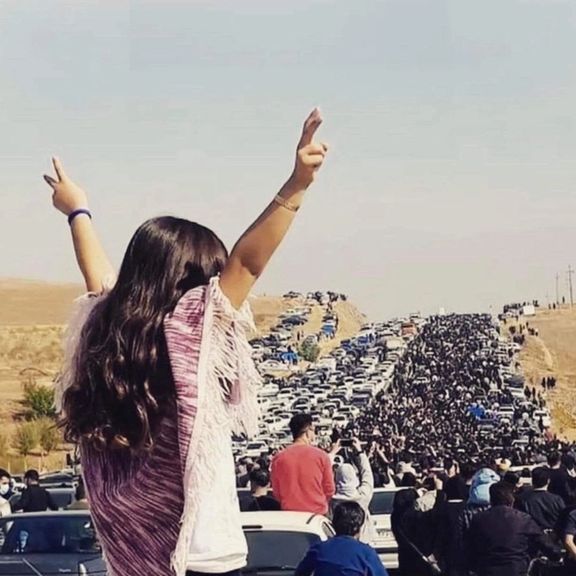
An Islamic Republic military convoy has been shown headed toward Saqqez, the birthplace of the late Mahsa Amini as security forces move to preempt protests on the eve of her anniversary.

An Islamic Republic military convoy has been shown headed toward Saqqez, the birthplace of the late Mahsa Amini as security forces move to preempt protests on the eve of her anniversary.
The Hengaw Human Rights Organization, specializing in coverage of events in Kurdish regions of Iran, released the video, coinciding with an announcement made by Amini's parents on Instagram indicating their intention to conduct a commemorative ceremony at her gravesite, marking the anniversary of her death aged just 22.
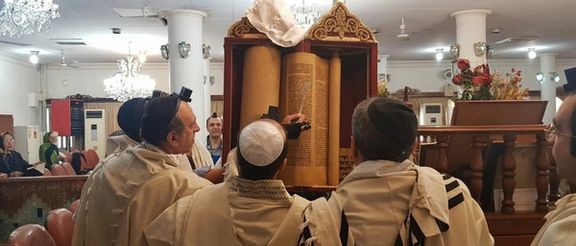
The one-year anniversary of Mahsa Amini’s murder coincides with the Jewish New Year on September 16, prompting community leaders to warn Jews to stay off the streets.
In a Telegram posting from Iran’s Jewish community on Sunday, the leadership wrote “All worshipers are strongly requested to refrain from stopping and gathering in the streets for any reason during Rosh Hashanah and after performing religious duties in synagogues.”
Alireza Nader, an Iran scholar based in Washington, DC, told Iran International, “The remaining few members of the Jewish community in Iran live in constant fear. Any sort of public pronouncement or guidance from their leadership should be seen in light of the community’s extreme vulnerability.” Nader has written about the persecution of Iranian Jews.
Beni Sabti, an expert on Iran from the Israeli National Security and Strategy Institute, who first located the Telegram post, told Iran International that the Jewish leadership is “worried that Jews can be in trouble if they stay in the streets” and urged them “to rapidly go from the synagogues to their houses.”
Sabti is a Tehran-born Jew who speaks fluent Persian and has extensively documented the Iranian regime’s repression of the country’s tiny Jewish population, which is estimated to number 9,000 members.
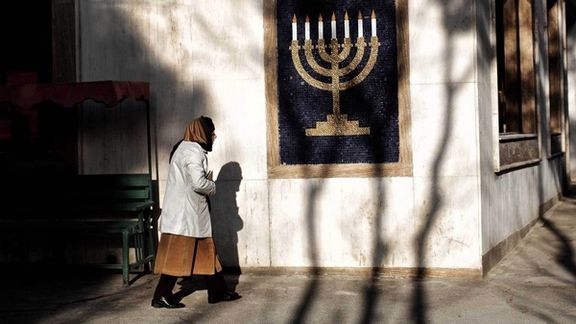
In April, Iran International reported that the Islamic Republic ordered Jews to participate in the antisemitic al-Quds Day rally during the Jewish holiday of Passover.
Sabti said the situation with Rosh Hashanah is comparable to Passover because the Jewish leadership said at the time on its Telegram platform: “Please do not go for picnics or enjoyable activities on al-Quds Day.”
Sabti added, “It is like al-Quds Day. They have to show their loyalty. They use delicate words. They use the kind of words that the regime can’t be upset with them for. The regime and Jews understand it.
They don’t say directly there are protests. This would be forbidden. They go around it. This is the kind of cultural talking for people with a Persian background in Iran.”
Prior to Iran’s Islamic revolution in 1979, Iran’s Jewish population numbered at least 100,000, most of whom fled after Ayatollah Ruhollah Khomeini seized power.
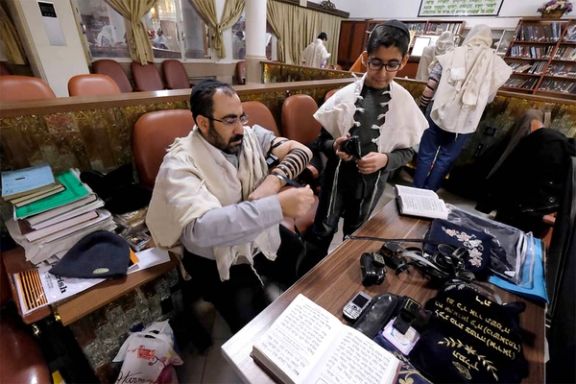
According to the Telegram post, the Jewish community wrote: “Coordination with the police force to create security and comfort for the grand ceremony of Rosh Hashanah .Respectfully, while congratulating in advance on Rosh Hashanah and wishing you a prosperous year, we inform you that by the grace of the Almighty and with the coordination made with the respected police force of Greater Tehran, the necessary arrangements have been made for the safety and comfort of our dear fellow believers for the celebration of the glorious and fateful day of Rosh Hashanah.”
Sabti noted the “Iranian Jewish leadership complimented the Iranian regime police. This is what they have to do.” He says the Iranian Jewish community has to “show they are loyal to the Iranian regime.”
The Telegram post noted “The public relations of the Tehran Jews Association, while thanking the loved ones of the police force for their unquestionable and constant help, has no doubt that the Kalimi community will once again draw a line against the evil plans of Iran's enemies and celebrate the magnificent ceremony of Rosh Hashanah away from any sidelines.”
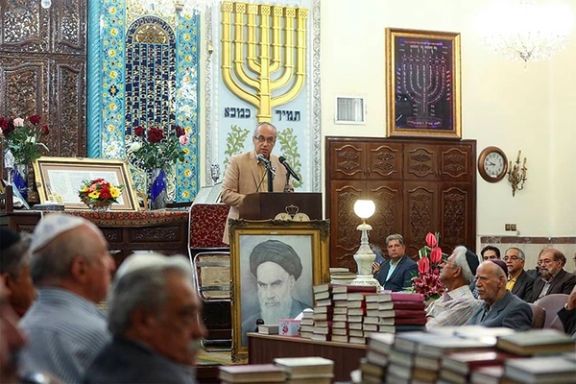
Sabti said the word Kalimi is a “polite word for Jewish” and “They don’t use the Jew because it means Zionist for the regime.” He said the Iranian word Kalimi can be loosely translated as the people from “Moses’s nation.”
Iran International exclusively reported in December that the Islamic Republic imposed pressure on religious minorities to compel them to condemn the uprising of the Iranian people following the murder of Amini in police custody.
Also in December, the regime arrested five Iranian Jews during the nationwide protests.
Iran’s regime and its foreign policy are based on an antisemitic world view, according to experts on the Middle East. The Middle East Media Research Institute (MEMRI) exposed Iran’s former foreign minister Mohammad Javad Zarif using an antisemitic term for Jews. “In a December 9, 2020 interview with Arman TV, Zarif used the antisemitic term for Jews – johood in Persian,” wrote MEMRI.
MEMRI noted, “A few days later, he attempted to cover up his statement with a dishonest attack on MEMRI. On December 16, he tweeted: ‘MEMRI has sunk to a new low in taking my pejorative usage of a word to accuse me of Antisemitism..."’
MEMRI added, “Foreign Minister Zarif is lying about Iran's positions on Jews and Israel. The MEMRI archives are full of research proving that the Iranian regime and its leaders are antisemitic and call openly for the annihilation of Israel.”
George Haroonian, one of the leading voices of the Iranian-Jewish community in the US, told Iran International "Contacting and coordinating with police in High Holidays is common practice wherever Jews are, but this announcement has some peculiar 'matters.' Who they mean by 'enemies' who might seize the occasion? Seems they are concerned about anti-Jewish elements within the country who might want to cause harm. As always, Jews are at the mercy of the regime."
He added, "I believe majority of Iranian people do not wish anything negative for Iranian Jewish community, but there is a minority who justifies their antisemitism based on variety of rationals. Based on Islamic beliefs as well as their hate for Israel."
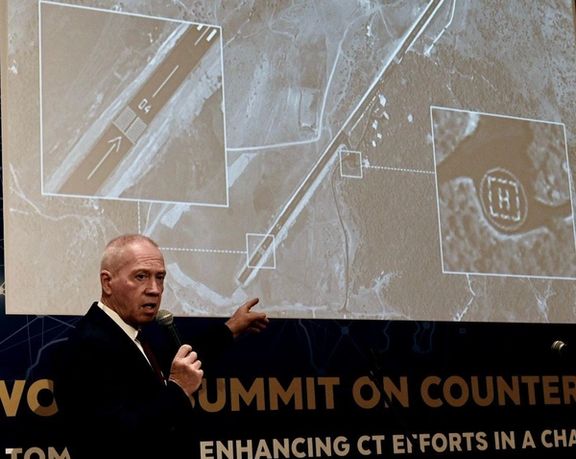
Israeli Defense Minister Yoav Gallant has leveled accusations against Iran, alleging the establishment of an airport facility in southern Lebanon.
Gallant asserted Monday that Iran's intention behind establishing the airport is to facilitate potential attacks against Israel.
Addressing an international security conference hosted by Reichman University, Gallant presented evidence in the form of aerial images of the alleged site. According to the defense minister, the site is strategically situated approximately 20 kilometers (12.4 miles) from the Israeli border town of Metulla and possesses the capacity to accommodate mid-sized aircraft.
The backdrop to this accusation is the current control of southern Lebanon by Hezbollah, an armed militant group backed by Iran, with which Israel engaged in a war in 2006. Recent months have witnessed a resurgence of tensions in the region, raising concerns about regional stability and renewed large-scale armed conflict.
For Iran's clerical regime, Lebanon serves as a foothold dominated by Hezbollah, affording them the means to threaten Israel. While many Shiites view Iran as a source of financial support, a significant portion of Lebanon's Christian and Sunni populations resent Hezbollah and Iran's growing influence.
The founder of the Islamic Republic of Iran, Ayatollah Ruhollah Khomeini and his successors, have consistently expressed enmity towards Israel and have repeatedly called for its destruction over the years. Iran's arming of Hezbollah with a substantial arsenal of rockets and missiles further compounds the security challenges, directly threatening Israeli cities due to Hezbollah's operational presence in Shiite-dominated southern Lebanon.
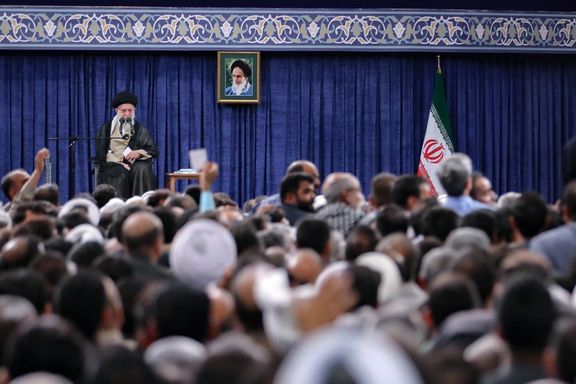
Iran’s Supreme Leader met a group of Baluch people Monday in a bid to pacify the community which has been holding protests since a government massacre last September.
The meeting in Tehran, which had been advertised by state media for weeks, included people from Sistan-Baluchestan Province where most Baluchis live and its neighboring province of South Khorasan. Rumors circulated that khamenei's office offered money for people to attend.
As Iranians are readying for rallies on the anniversary of last year’s protests, there are reports that the office of the Supreme Leader is especially worried about the protests among the Sunni population of the country, more than 10 million people who are mainly Baluch or Kurd.
Since earlier this month, regime-affiliated media had been reporting that Khamenei may meet with some of the families of the victims of Bloody Friday, the massacre that killed around 90 civilians in the wake of Mahsa Amini's death. Residents have been holding anti-regime demonstrations for the past 49 weeks unabated. Bloody Friday, the suppression of protests on September 30, 2022, saw citizens, including women and children lose their lives due to direct gunfire from military and security forces, with many succumbing to head and chest injuries.
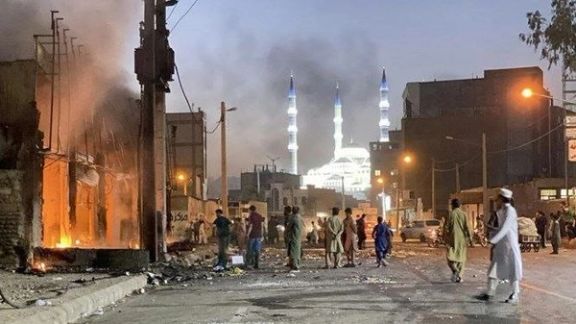
The Sunni Friday Prayer Imam of Zahedan, Mowlavi Abdolhamid, persistently called for an investigation into the massacre and the prosecution of those responsible. However, to date, no one has been charged or tried in connection with the incident. The outspoken cleric, officially known as Sheikh Abdolhamdid Esmailzehi, is largely popular because of his willingness to challenge the absolute authority of Khamenei. Late last year, a hacktivist group leaked documents indicating that Khamenei is dismayed by Abdolhamid’s unrelenting criticism, and has ordered underlings to tarnish Abdolhamid’s reputation to diminish his influence.
The advocacy group Haalvsh, which reports on issues and events in Sistan-Baluchestan province, said that people of provincial capital Zahedan have written slogans on the walls of the city against those meeting with Khamenei, noting that the attendees by no means represent the people of the province. Many were referred to as “disgraced" and traitors to the martyrs. An X (formerly twitter) campaign was also launched against the meeting, trending a hashtag translated as “No to meeting the dictator.”
Khamenei’s speech during the meeting was predictably trite, with the aging ruler repeating his usual jargon, deflecting blame for all the failings of the regime onto the US and its allies, while at the same time claiming that Western powers are in decline with new regional and global powerhouses on the rise. “The arrogant power of America and some European countries has weakened and will become weaker,” he said.
“Our information tells us that the American government has created a crisis group with the mission to search for the points which they think can be used to provoke a crisis in Iran. With contemplation and study, they have concluded that there are several crisis points in Iran: ethnic differences, religious differences, and the issue of gender and women, which should be provoked to create a crisis,” Khamenei claimed.
It was not clear if he was referring to a particular group or just repeating conspiracy theories about US supported groups and organizations.
“All people from different ethnicities and religion groups should join together. Since there is a clear direction, this unity is important," Iran's ruler added.
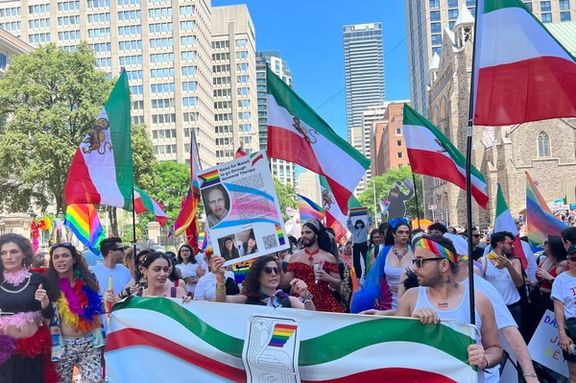
Iranian LGBTQ activists have endorsed worldwide protests on September 16 to commemorate the death of Mahsa Amini.
In a joint statement, activist groups such as Simorgh, Six Colors, the Iranian Rainbow Coalition, and the Queer Rights Group claim that the current revolutionary wave holds the potential to secure the liberation and equality of the rainbow community in Iran, marking the end of centuries of discrimination and prejudice, including to the country's LGBTQ community.
They have called on political and social groups, both within and outside of Iran, to join in anti-regime protests.
Since the inception of the Women, Life, Freedom uprising, the Iranian LGBTQ community has been at the forefront, articulating their vision for a post-Islamic Republic Iran through active participation in both domestic and international protests.
Despite the many challenges faced by LGBTQ individuals in Iran, they continue to confront dangers, including the risk of execution and other forms of punishment under the laws of the Islamic Republic.
Iranian authorities have resorted to derogatory labels and stigmatization when addressing LGBTQ citizens, referring to them as "deviant" and "sick", same sex relations forbidden in Islamic laws.
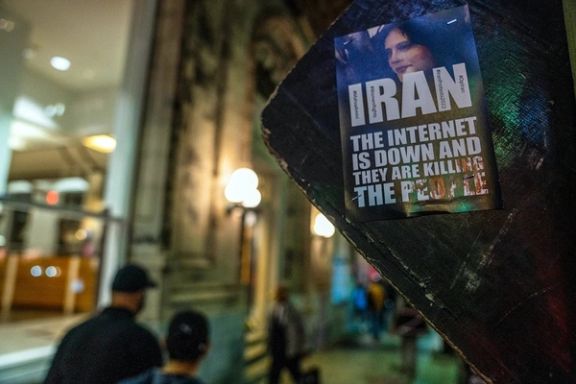
For the second consecutive night, Iran has experienced a significant disruption to its internet services, the nation's connectivity plummeting to 71% of its standard levels during the latest outage.
The development follows a consistent trend of internet restrictions within Iran, with the government exerting more pressure to quash anti-regime sentiment online, particularly relating to raising momentum for further protests in the coming days as the anniversary of Mahsa Amini's death nears.
Over the past two decades, Iran has imposed strict censorship measures on internet access, limiting citizens' ability to freely obtain information. This encompasses the blocking of numerous foreign and domestic websites, including reputable news outlets. However, these restrictions have been circumvented through the widespread use of Virtual Private Networks (VPNs) and anti-filtering software.
Recent months have witnessed a more aggressive push by hardliners in the Iranian parliament to ratify legislation that would further restrict access to social media and the internet. Additionally, reports have circulated regarding plans to launch a domestic intranet, enabling authorities to exercise greater supervision over its content.
Amini died nearly a year ago during her detention by the morality police while en route to Tehran.
She is said to have died of brutal head wounds and her passing sparked one of the most substantial anti-government protests in the 44-year history of the Islamic Republic of Iran.
The aftermath of last year's protests saw a deadly crackdown by the regime, resulting in the tragic loss of more than 500 civilians, with thousands sustaining injuries and tens of thousands arrested.
The Iranian regime has neither disclosed official figures nor assumed responsibility for any of the casualties.






